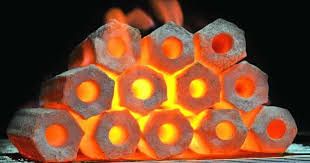From Waste to Wealth: Pilot Scale Production of Smokeless Bio-briquettes from Waste Materials for use as Alternative Energy Resource
Countries all over the world are worried about environmental problems occasioned by climate change. This calls for a safer, cleaner, greener and more reliable source of energy for household, commercial and industrial processes

Most countries of the world is facing three obvious challenges of human development. These are (i) how to manage large amount of domestic and industrial wastes generated from ever-increasing population in the country, (ii) how to control/reduce over-dependence on non-renewable energy resources - oil and gas (Phan, 2016) as well as over-dependence on rapidly depleting forest resources - fuelwood and other biomass (Omaka, Nwabue, Itumoh and Okeke, 2013) - and (iii) how to reduce deterioration of the environment occasioned by the continuous use of non-renewable energy resources which has resulted to serious climate change and global warming (Kampa and Castanas, 2008; Riojas-Rodriguez, Romano-Riquer, Santos-Burgoa, and Smith, 2001).
As a result of these aforementioned challenges, many researches are geared towards developing renewable energy resources and energy efficient technologies for domestic use. This has led to the development of biofuels, bio-briquettes and other biomass related energy resources over the past two decades. However, to develop a new renewable energy source for domestic use and to bring same to consumers certainly require the most complex logistical effort. This is because (i) many of the raw materials on which the growth of renewable energy resources depend come with supply constraints (Voser, 2009). This implies that there must be an effective way to sustain the supply of the raw materials and at a cheap rate, and (ii) there is also a challenge of how to build a new energy system/technology that is capable of meeting energy needs of future generations at much reduced environmental and economic cost. This means that the energy resource must address environmental challenges during its production and use, and must be affordable to the average Nigerian.
Our research proposal is meant to address these challenges. We intend to develop smokeless bio-briquettes from domestic waste (a way of managing and reducing environmental wastes) as an alternative domestic energy resource (a way of offering an opportunity to reduce over-dependence on fossil fuel) and as a green technology in the production process as well as product use (efficient burning -smokeless, with less and reusable by-products).
We intend to address these challenges from our research by providing answers to the following questions:
(i). How can we manage large volume of domestic and industrial wastes generated from our ever-increasing population by converting them to useful energy resource using briquetting machine?
(ii). How can we diversify national energy mix and domestic energy resource market from its over-dependence on fossil fuel by introducing an alternative energy resource?
(iii). How can we develop domestic energy resource that is green with less economic and environmental costs during its production and use?
(iv). In what way can the prepared bio-briquettes be tested for ignitability, burning characteristics and physical properties for suitability for use as fuelwood substitute?
(v). Does the prepared bio briquette present itself as safe, clean domestic solid fuel which when used has the potential to free pressure not only on fuelwood but also kerosene and cooking gas whose entry and selling costs are prohibitive?
(vi). Is there any commercial viability and economic feasibility of producing smokeless bio-briquettes from waste materials?
(vii). Does the produced bio briquette compare in utilization as domestic, industrial and commercial solid fuel with kerosene, fuelwood and wood charcoal?